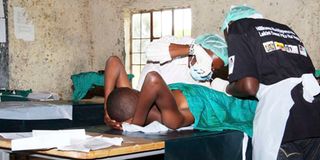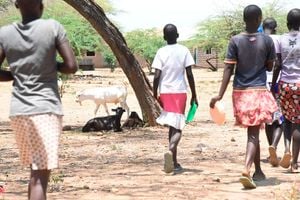
Nurses carry out voluntary medical male circumcision procedure on a boy.
Mount Kenya elders have differed on the age of circumcision for area boys, some insisting it should be 12, another wing for 14 and others rooting for 16.
Circumcision is one of the most important ceremonies in the area communities where initiated males automatically join the age of warriors enroute to marriage and becoming elders.
Since the advent of formal learning, graduation from primary school has been the measure of circumcision age for the bright boys not prone to mark timing in class.
However, from the real culture where boys were being circumcised at dawn on river banks after they had bathed in snow-cold waters, bracing raw pain, today they report to hospitals for minor surgery complete with anesthesia, some accompanied by their mothers and sisters.
The region circumcises its boys in December, unless under other considerations like health, cultural petitions, and guardians preference where April and August are considered also to be circumcision months.
Those who have hidden themselves from the cut once identified, however, can undergo the ritual any day of the year.
Currently, the Competence Based Curriculum (CBC) education system has placed Junior Secondary (Grade 6) age at about 12 years, but to be domiciled in primary school for three years (up to Grade 9) where the boy will have a minimum age of 16 years.
There is further politics where Kenya Secondary School heads want the Grade 8 and 9 moved to gazetted Secondary schools hence inducing circumcision age to 14 years.
This has brought to the fore a split among the elders in the supreme Kiama Kia Ma, with its 'king' Thiong'o wa Gitau insisting that the age should be 16.
But the national patron, Mr Kung'u Muigai has come out disputing the king's stand, instead saying 14 is the age that should prevail.
To that effect, Mr Gitau has announced that there will be no circumcision rite for area boys this year, while Mr Kung'u insists it will go on as scheduled.
Circumcision comes with huge monetary gain since hospitals, elders and some churches organise for full boarding mass cut drives where the charge per initiate is roughly between Sh10,000 to Sh50,000, depending on the financial muscle of the guardians.
The cultural elders have been quarreling with the spiritual elders on who should cash in on the lucrative business, already a cultural caucus bringing together area weasels declaring that they intend to complete in 2026, ban the clergy from playing any circumcision role.
The clergy has hit back saying God cannot be delinked from rites of passage and spirituality for area men cannot be sacrificed at the altar of cultural beliefs.
"The ever-changing education curriculum is distorting the age set for circumcising our boys hence why we must now insist on 14 as the ripe age for the rite," said Muigai
The rift has confused parents who believe in the supremacy of elders to set circumcision dates.
"My son is in Grade 5 and will be joining Junior Secondary next year. If joining secondary education is the measure for circumcision, it means I should have him undergo the cut this December at the age of 12," said Mr Kinuthia Mburu from Murang'a County.
But he sees the age of his son to be inadequate hence preferring to wait "until he is 14, this being the age I got circumcised after I cleared my class Eight in the previous 8-4-4 Education system."
He however says the CBC system still places boys aged 14 years in primary schools, hence presenting him with a dilemma of waiting until his son is 16 years old.
He fears that the age of 16 is too close to adulthood "and my son might have by then impregnated a girl hence presenting my family with the indignity of having a descendant sired by an uncircumcised father."
The Agikuyu culture frowns upon uncircumcised men who are looked down upon to the point where they cannot be included in serious cultural functions like dowry negotiations, populating the clans through procreation, and leading war battalions.
While the ultimate decision to circumcise one boy is solely vested in the parent/guardian or individual, Mr Gitau said "There is no need to circumcise the boy and then he goes back to primary school to interact with the uncircumcised ones in Grades 1 to 5.
"Even if we adopt Grade 8 as the circumcision age that previously applied, the fact that the boys will still be domiciled in primary school makes it equally untenable since they will be interacting with the uncircumcised in Grades 1 to Grade 7," Mr Gitau said.
But in his rejoinder, Mr Muigai wonders "What is the wisdom in Mr Gitau's argument given that whatever age one circumcises, in the societal setup, they will still be interacting with the uncircumcised."
Mr Muigai said, "Once a boy gets circumcised at whatever age, he goes home to interact with uncircumcised siblings and neighbours."
"The school system being orderly and governed by rules, cases of indiscipline as feared to include the circumcised molesting the uncircumcised or hostilities generating the 'cut wars' in schools need not form the basis of calling for the postponement of the rite of passage."
But Mr Gitau wonders what would be the necessity of circumcising a boy only to send him to the legion of the uncircumcised.
He said when the circumcised meet in high school, they become a compound community that pursues life goals from a point of self-consciousness even in the environment, that indeed they are men."
He said mixing boys and men distorts mindsets, focus, and inculcation of maturity."
But Mr Muigai calls it bluff saying "those fears do not apply at the domestic home front since the boys even mix with women and there is no reported crisis in how they develop in mindsets, focus, and maturity."
The elders have been confusing area parents with their tussle on circumcision age since last year when a different wing had declared age 12 as the most ideal.
“The elders have advised that the desirable age of the rite of passage is 12 years down from the previous 14 years," said Patrick Muiru, the Secretary-General, of Kiama Kia Ma.
He added that while the decision to take the child through the rite of passage was dependent on the parent/guardian, "it is prudent to follow the education transition calendar that had placed graduation to secondary school at age 12."
The elder in charge of the rite of passage in the Kiama Kia Ma, Mr Joseph Thiong'o consequently announced that the official age for circumcision for area boys is 12.
"We have since held consultations with health and psychologists to broaden the age gap,” said Mr Thiong’o,
He urged school heads and teachers to protect children joining junior secondary without undergoing the rite of passage from bullying adding that parents had a right to choose the right circumcision time for their child.







